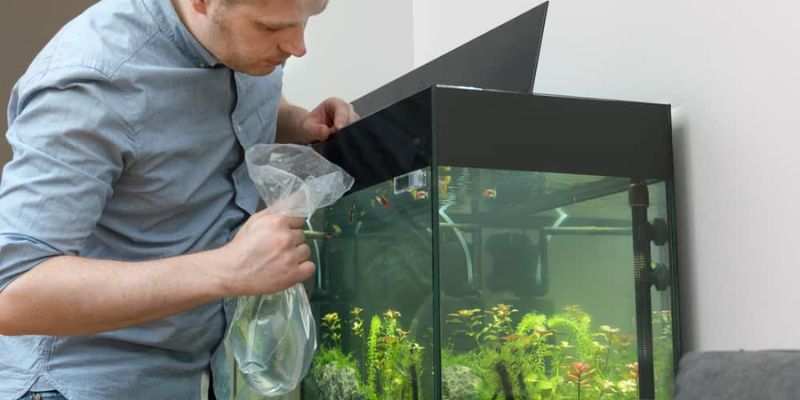In this detailed manual, we’ll show you “How to Introduce New Fish to an Existing Aquarium?”. No matter how long or how often you’ve kept an aquarium before, you still need to do things the right way for the sake of your aquatic pets’ health and happiness. If you follow these guidelines, you should be able to establish a healthy marine ecosystem.
How to Introduce New Fish to an Existing Aquarium?
Checking for Agreement
It’s important to think about how new fish will get along with the current inhabitants of your existing aquarium before adding any new fish. Discord between people can cause violence, tension, and even death. Some essential considerations are as follows:
Physical Appearance and Characteristics
Make sure the new fish are about the same size as the existing fish and have comparable habits. Some fish species can be aggressive or territorial, which might upset the equilibrium of the aquarium and put timid fish at risk.
Water Quality Measurements
The health of your aquarium’s inhabitants depends on your ability to keep the water’s conditions consistent Fish have highly specific requirements for environmental conditions like temperature, pH, water hardness, and salinity. Find out what kind of conditions the new fish prefers, and make sure they’re compatible with the current residents.
Diet and Frequency of Consumption
Consider the diet and feeding habits of the new fish. Some species may have peculiar food requirements, or their eating habits may threaten native species. Make sure the aquarium’s fish can get along during feeding time.
The New Fish Must Not Mixed!
The introduction of new fish into the main tank necessitates a quarantine period to prevent the spread of disease. This space allows you to monitor the new fish for any signs of disease before introducing them to the main tank. Here’s what you need to do during the quarantine if you want it to be effective:
The First Step: Prepare a Quarantine Area
The quarantine tank should be warm, filtered, and have plenty of hiding places for the fish. The size of the quarantine tank will depend on the total number and size of the new fish.
Give the Fish Some Time to Adjust
The new fish should be acclimated to the main aquarium’s water parameters by slowly introducing water from the main aquarium into the quarantine tank over the period of several hours.
The fish will be less stressed and more able to adapt to their new surroundings if you follow these steps.
Keep an eye out for symptoms of illness
Check for symptoms of sickness in the new fish, such as aberrant behavior, loss of appetite, and physical abnormalities during the quarantine period. In the event of any problems, it is recommended that you seek the advice of a vet or an experienced fish keeper.
The Debut of the New Fish
After a period of quarantine, during which the new fish are monitored for any signs of illness, they can be added to the established aquarium population. To make the change as painless as possible, consider the following:
The First Step: Stock the Main Aquarium
Make sure the primary tank is spotless and devoid of any territorial decorations or hostile creatures before introducing the new fish. If you want to lessen territorial hostility, rearrange the furniture.
Reduce Tank Lighting and Turn Off Lights
Before introducing the new fish, make sure the aquarium is dark and the room lights are low. The fish are soothed and their aggression is reduced as a result.
Initiation at a Steady Pace
Take care while releasing the new fish into the main aquarium from the quarantine tank; use a net to do so. Instead of throwing them in the water right away, give them a few minutes to adjust in the net. Using this strategy, the fish can gradually adapt to the new water temperature.
Keep an eye on everything
Carefully observe the fish for signs of hostility or discomfort after releasing them into the main aquarium. Make sure all the fish have a safe place to hide and that they are all getting fed.
Conclusion
When adding new fish to an existing aquarium, it’s important to plan ahead and follow the right protocols to ensure everyone’s fish stays happy and healthy. Reduce stress, hostility, and illness risk by determining fish compatibility, quarantining the new fish, and introducing them gradually.
Always keep an eye on how the fish are acting and make modifications as needed. Following these suggestions will help you build a stronger aquarium neighborhood.

